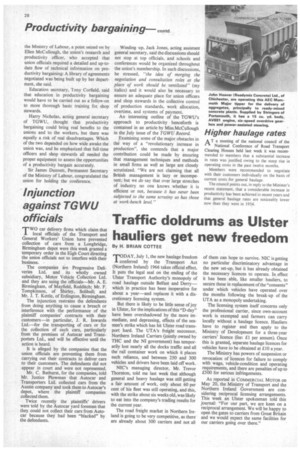Traffic doldrums as Ulster hauliers get new freedom
Page 30

If you've noticed an error in this article please click here to report it so we can fix it.
By H. BRIAN COTTEE TODAY, July 1, the new haulage freedom conferred by the Transport Act (Northern Ireland) 1966 takes official effect. It puts the legal seal on the ending of the Ulster Transport Authority's monopoly of road haulage outside Belfast and Derry— which in practice has been inoperative for about a year—and replaces it with a discretionary licensing system.
But there is likely to be little sense of joy in Ulster, for the implications of this "D-day" have been overshadowed by the more immediate. and depressing, effects of the seamen's strike which has hit Ulster road transport hard. The UTA's freight successor, Northern Ireland Carriers (jointly owned by THC and the NI government) has temporarily lost nearly all the docks traffic and all the rail container work on which it places such reliance, and between 250 and 300 vehicles and drivers have been laid off work.
N1C's managing director, Mr. Trevor Thornton. told me last week that although general and heavy haulage was still getting a fair amount of work, only about 60 per cent of his fleet was still operating, and this, with the strike about six weeks old, was likely to eat into the company's trading results for the current year.
The road freight market in Northern Ireland is going to be very competitive, as there are already about 300 carriers and not all of them can hope to survive. NIC is getting no particular discriminatory advantage in the new set-up. but it has already obtained the necessary licences to operate. In effect it has been able, like smaller hauliers, to secure these in replacement of the "consents" under which vehicles have operated over the months following the break-up of the UTA as a monopoly undertaking.
The licensing system itself concerns only the professional carrier, since own-account work is exempted and farmers can carry locally without a haulage licence. Hauliers have to register and then apply to the Ministry of Development for a three-year carriers' licence (fee: £1 per annum). Once this is granted, separate haulage licences for vehicles have to be obtained at £10 a year.
The Ministry has powers of suspension or revocation of licences for failure to comply with wage, vehicle-condition and operating requirements, and there are penalties of up to £500 for serious infringements.
As reported in COMMERCIAL MOTOR on May 20. the Ministry of Transport and the Northern Ireland Government are considering reciprocal licensing arrangements. This week an Ulster spokesman told this journal: -For our part, we are keen on a reciprocal arrangement. We will be happy to open the gates to carriers from Great Britain and we would expect the same facilities for our carriers going over there."




























































































































